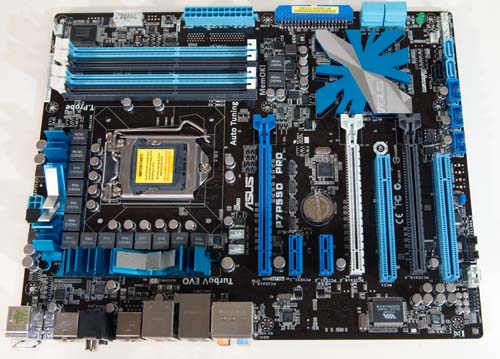Loyd's New Year - A Trio of Problem Systems
by Loyd Case on January 13, 2010 12:00 AM EST- Posted in
- Systems
The Constantly Crashing P7P55D
Now let’s consider a different problem, also with an Asus motherboard at its core.
I’d built a system running a Core i7 860 and the Asus P7P55D. The GPU installed was an AMD Radeon HD 4890. The system booted normally, and Windows 7 installed with no hiccups.
Periodically, the system would go into sleep mode – this was normal – but would then lock up. This was decidedly not normal. Occasionally, the system would lock up during multiplayer gaming sessions, too. Updating the BIOS didn’t fix the problem.

Then I came across several posts on several forums suggesting an incompatibility that was specific to the Radeon HD 4890. So I swapped in an eVGA 260 GTX Core 216 SSC.
Lockups still occurred, with the same frequency and symptoms. So the problem had nothing to do with graphics cards. Finally, I removed the memory – some early Corsair DDR3-1600 (though it was only running at 1333MHz) and swapped in some OCZ DDR3-1600 (also running at 1333MHz.)
The system has now been running smooth as silk over multiple gaming sessions.
These particular Corsair memory modules had actually given me fits in a number of different Intel-based motherboards, including P45, X48 and now a P55 motherboard. The Corsair memory is a 4GB kit, labeled CMS3X2048-1600C7DHX. What’s interesting about these modules is that when you drop them in an AMD AM3 based motherboard, the system seems to run perfectly fine. It’s quite a mystery, but illustrates how complex the issue of compatibility between components can be.
Lesson learned: nothing in particular, except to maybe to not trust forum posts, even multiple posts that may agree with each other. The graphics card wasn’t the problem here – once again, it was DRAM.
One other thought: despite rapidly falling DDR3 memory prices (or maybe because of rapidly falling prices), the state of the art in DDR3 modules seems to be evolving rapidly. This seems to create incompatibilities between specific motherboards and specific modules. I’ve had Kingston modules run great in Gigabyte motherboards and behave in a crashtastic manner in Asus boards. I’ve had OCZ memory behave badly in Intel boards, while running like a champ in eVGA X58 boards. Whether I adjusted timings, or ran in default modes, didn’t seem to matter.
How anyone can keep track of which modules run well on which motherboards at this point in time is a mystery. So the lesson here, I suppose is: if you don’t have a large supply of different modules and motherboards on hand – and most people don’t – make sure you buy your components from a reseller with a robust return and exchange policy.










109 Comments
View All Comments
deimos3428 - Wednesday, January 13, 2010 - link
Throwing hardware at a performance issue only buys time.Zelog - Wednesday, January 13, 2010 - link
That's what she said.TinksMeOff - Wednesday, January 13, 2010 - link
As a computer tech for over two decades I found this article rather refreshing to hear from a site such as Anandtech.com. You may wish to note as well that 'different parts' don't mean better parts. Under manufacture warranties, techs replace RAM, MB, CPU, GPU and HD's with the exact same parts. They just overheat, wear out or whatever and go bad over time. I not saying don't look for a better quality part, just check your warranties and get it replaced with the same parts with very little overhead (shipping & time usually).Of course, most people will not have extra parts to experiment with as your article mentions.
ciparis - Wednesday, January 13, 2010 - link
Nice article, Loyd! Good to have you here and away from all those PC magazines you've been writing for for so many years :)I had the original version of that P6T -- just sold that system after over a year of rock-solid stability. Good choice.
blyndy - Wednesday, January 13, 2010 - link
Loyd, for future reference, if your PC is running 'slow as molasses' in a loosely controlled software environment you should suspect software foremost, not hardware.Sadly, you could have confirmed or confuted that possibility simply by swapping in a spare drive (or ghosting) and doing a clean install and comparing performance.
If performance was still slow then suspect hardware.
vol7ron - Wednesday, January 13, 2010 - link
I agree.Regarding your daughter's computer:
Instead of doing a clean install, I think you should have tested the problem out a little bit - it might have been worthwhile to your readers.
1) I would like to know if the Device Manager was showing everything as connected and running properly (for all the problems)
2) I would have liked to see you get a Registry Mechanic, or some other sort of registry cleaner.
3) I would also like to know if you ran a scandisk or disk defragmenter. Often fragments cause problems.
4) I would like to know if you had any problems in safe-mode. Safe-mode is a good indicator of solvable problems. (as with running Hijack-This).
-----------------
With regards to the other problems, I am also curious if this could have been due to some "Win Rot". I would have liked to see some fresh installs before determining it was purely hardware.
loydcase - Wednesday, January 13, 2010 - link
Well, your point was embedded in my "lessons learned". Changing too many variables when trying to troubleshoot a problem sometimes mean you don't actually track down the real cause... or waste time until you do.OCedHrt - Wednesday, January 13, 2010 - link
Sometimes it is simply faster to start over than to find the problem :)Also, the not always posting in the last one can very well be a PSU issue where it can't provide enough amps for cold boot when warm.
smn198 - Wednesday, January 13, 2010 - link
Hindsight is always 20:20!